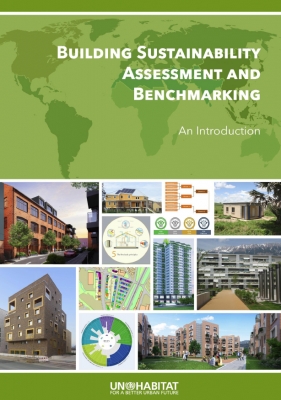Building sustainability assessment and benchmarking: an introduction
 Over the past 30 years, the number, scope and complexity of tools for assessing the environmental impact of buildings has increased dramatically. Examining the emergence of building sustainability assessment and benchmarking as a global phenomenon as well as some of their political and practical barriers can be useful in order to understand their possible role in realizing objectives of the ‘New Urban Agenda’ and the policies to be influenced by it. As part of UN-Habitat’s mandate to promote sustainable urban development through knowledge-creation and management, this report intends to address some of these concerns and contribute to four objectives: Establish the rationale for building sustainability assessment and benchmarking; Identify challenges and limitations that occupants, policy-makers and building practitioners face in applying or interpreting building sustainability assessment or benchmarking tools; Provide a sample overview of some environmental sustainability assessment and benchmarking tools for buildings and housing as well as those attempting to measure social and economic impacts; and Identify pathways for the wider uptake of assessment tools by industry, professional bodies, policymakers, vocational and higher education, and other actors working within the built environment.
Over the past 30 years, the number, scope and complexity of tools for assessing the environmental impact of buildings has increased dramatically. Examining the emergence of building sustainability assessment and benchmarking as a global phenomenon as well as some of their political and practical barriers can be useful in order to understand their possible role in realizing objectives of the ‘New Urban Agenda’ and the policies to be influenced by it. As part of UN-Habitat’s mandate to promote sustainable urban development through knowledge-creation and management, this report intends to address some of these concerns and contribute to four objectives: Establish the rationale for building sustainability assessment and benchmarking; Identify challenges and limitations that occupants, policy-makers and building practitioners face in applying or interpreting building sustainability assessment or benchmarking tools; Provide a sample overview of some environmental sustainability assessment and benchmarking tools for buildings and housing as well as those attempting to measure social and economic impacts; and Identify pathways for the wider uptake of assessment tools by industry, professional bodies, policymakers, vocational and higher education, and other actors working within the built environment.
